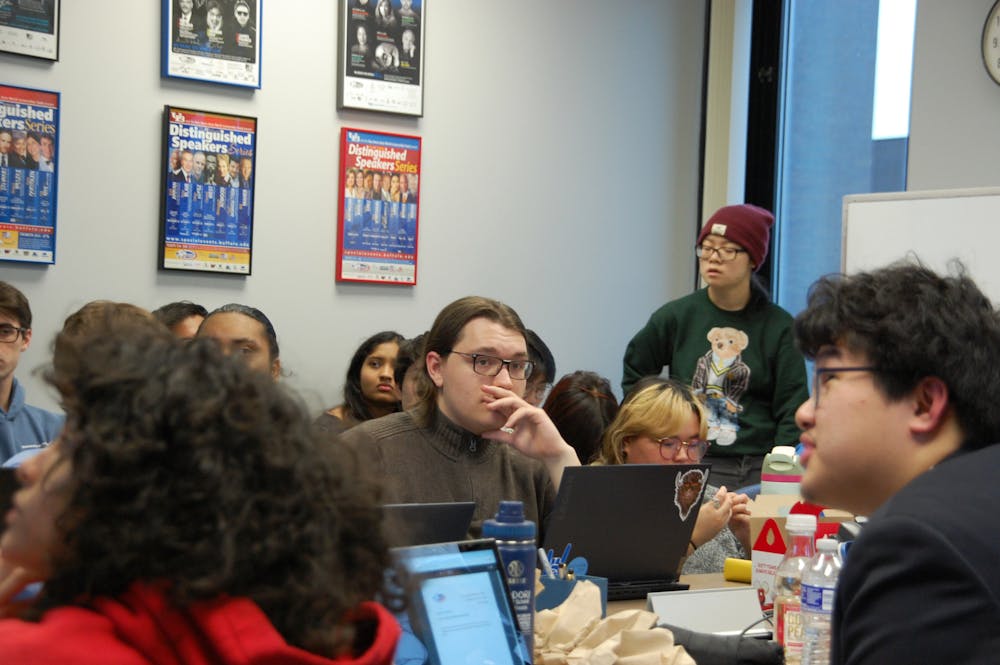At its meeting Wednesday, the Student Association (SA) Senate joined other student governments across New York State to endorse amendments to a statewide bill that would require schools, colleges and universities to train staff for suicide prevention and adopt reporting policies.
The proposed changes to the Student Suicide Prevention Act (SSPA) would require that all schools teaching higher than the third grade, as well as all public and private colleges and universities, implement policies for reporting and responding to suicide attempts. It would also mandate suicide prevention training for K-12 school employees and require that student ID cards include the telephone numbers of suicide prevention hotlines.
The bill, introduced by Assemblymember Daniel O’Donnell (D-Manhattan) and state Senator Brad Hoylman-Sigal (D-Manhattan), comes in response to a substantial increase in youth suicide rates. According to the Centers for Disease Control and Prevention (CDC), the rate of suicide among people between 10 and 24 years old rose more than 62% between 2007 and 2021. Suicide is the third leading cause of death for people aged 15 to 24 in the U.S.
O’Donnell first introduced the SSPA in the 2019-20 legislative session, but the bill has repeatedly stalled in committee since then. In an emailed statement, O’Donnell said the bill will help protect students’ mental health.
“This act extends beyond mere prevention - it actively encourages open discussions about mental health and ensures every student has access to crucial resources and support exactly when they need it most,” O’Donnell wrote. “No student should have to wrestle with mental health issues in silence, and this legislation guarantees that won't happen.”
At UB, 28 students died by suicide between 2007 and 2022, with 10 of those deaths following the fall 2019 semester.
By endorsing the SSPA, SA joins more than 50 student governments at public and private institutions across New York, One More Option founder Vignesh Subramanian says.
Subramanian, a Stony Brook pre-medical student, has led calls for student governments across the state to support the bill. Speaking to the Long Island Press earlier this month, Subramanian said he was spurred to take action after losing one classmate to suicide in eighth grade and another during the early months of the COVID-19 pandemic.
“This entire initiative is about raising awareness and equipping people to deal with suicide and mental health crises from the ground up,” Subramanian told The Spectrum. “That means training students like RAs — as well as residential staff and faculty — to recognize signs of suicide, record warning signs and refer students to help where appropriate.”
Subramanian said that while college and university administrators are typically reluctant to weigh in on legislation, presidents at Stony Brook, Hofstra University and Long Island University have expressed support for the SSPA in meetings with student government leaders. He says several chapters of the United University Professions (UUP), the union representing SUNY faculty, have also expressed tentative support for the measure.
“Getting support of union members, like those of UUP, is kind of critical, because those members are the same people who are going to be executing these protocols,” Subramanian said.
He said the bill also benefits university administrators.
“A lot of universities and colleges simply haven’t developed these kinds of policies or strengthened them, because they don’t have guidelines,” Subramanian said. “The state has never passed a law requiring them to develop these kinds of policies, and [SUNY]… has never issued guidelines to actually guide them on exactly what to do when creating these kinds of prevention and response protocol policies. If anything, it’ll just help universities.”
At Wednesday’s Senate meeting, SA President Becky Paul-Odionhin encouraged senators to support the resolution.
“[We] want to expand the act to include colleges and universities and require the development of specific suicide prevention policies on the different campuses,” she said. “Basically, mandate it across all schools in New York as opposed to just leaving it to schools to figure out how they’re doing it.”
UB offers free counseling services, suicide prevention training, walk-in crisis counseling and a 24/7 emergency helpline for students in distress, and residential staff are trained annually, Sharon Mitchell, director of counseling services, said.
“While we do not know all of the details of the proposed legislation or its ultimate outcome, we feel UB is already adhering to the general expectations of what is being proposed to our state lawmakers,” Mitchell wrote in an email.
She added that UB will hold its inaugural walk and roll for suicide prevention on Saturday, April 13.
Assemblymember Karen McMahon (D-Williamsville), whose district includes UB’s North Campus, expressed support for the SSPA.
“The rate of suicides and attempted suicides by students and young adults is one of the most troubling problems facing this age group,” McMahon wrote in a statement Monday. “The Student Suicide Prevention Act (SSPA) is an important piece of legislation that could enable teachers, counselors, and other education professionals to spot the warning signs for suicide and to appropriately and expeditiously intervene. I thank the University at Buffalo Student Association for voicing its support for this legislation.”
A representative for Governor Kathy Hochul’s office was noncommittal, writing in an email that “Governor Hochul will review all legislation that passes both houses of the legislature.”
A similar bill became law in New Jersey last year, and more than half of states have enacted similar laws, according to the American Foundation for Suicide Prevention.
Representatives for SUNY and Assembly Majority Leader Crystal Peoples-Stokes (D-Buffalo), whose district includes UB’s South Campus, did not comment in time for publication.
The UB Counseling emergency helpline is available at all hours and can be reached at 645-2720. The crisis text line can be reached by texting “HOME” to 741741.
The National Suicide Prevention Hotline can be reached at 1-800-273-8255 or by dialing 988.
Sol Hauser is the senior news editor and can be reached at sol.hauser@ubspectrum.com.





